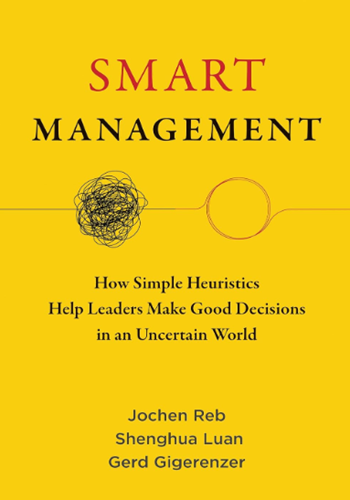By Ray Bert
Smart Management: How Simple Heuristics Help Leaders Make Good Decisions in an Uncertain World, by Jochen Reb, Shenghua Luan, and Gerd Gigerenzer. Cambridge, Massachusetts: The MIT Press, 2024; 272 pages, $45.
Because this book aims to turn much conventional wisdom about smart management on its head, let’s do something similar and start with Smart Management’s two conclusions: 1) Take uncertainty seriously, and do not reduce it to risk; and 2) do not avoid heuristics, but learn to use them intelligently.
Further reading:
- Civil engineering leadership in a modern era
- Do leadership and social skills come naturally to civil engineers?
- Book explores how to think long term in a short-term world
To ensure we fully appreciate the authors’ viewpoint on heuristics (straightforward, often informed-intuition rule-of-thumb approaches), we’ll look at their two fundamental takeaways of the book in turn. First, how do they define uncertainty, and how does it differ from risk? Uncertainty here means a situation where not all possibilities are known or even knowable. This, of course, describes quite a number of complex real-world situations – in politics, finance, and many other arenas.
Risk, by contrast, is “a situation where the probabilities of all consequences in each possible future state are known.” While this is a useful concept when dealing with “small worlds” and limited variables, it breaks down when the truly unforeseen or unexpected happens. That’s where heuristics come in because their intelligent use (their second takeaway) can often do a better job cutting through the noise of uncertainty.
Why does this matter? Because in the authors’ view, far too many business and management decisions are made or justified based on data, complex analytical methods, and attempts at optimization that – in the face of true uncertainty – are inadequate or simply offer a false sense of certainty.
Smart Management argues that there is a persistent stigma from some in the business world (the authors place significant blame broadly on business schools’ teaching methods) about using heuristics as opposed to being more quantitatively oriented. In a telling anecdote, the authors write: “When one of us asked the principal of one of the largest consulting firms worldwide how many of the firm’s projects involved justifying decisions that had already been made, the response (given on condition of anonymity) was that it was over 50 percent.”
The authors then set about demonstrating that many executives and companies actually do make frequent use of heuristics with good results. The book’s first part covers what it calls “the adaptive toolbox” of heuristic approaches, in which the authors give many examples of simple heuristics – from the wisdom of crowds to the “1/N” diversification model for allocating limited resources when the past is unlikely to predict the future. For more clearly management-oriented heuristics, in part 1 they start with discrete examples such as simple hiring/firing decision trees, but they build on this in part 2 and progress to much broader (but not necessarily more complex) strategic heuristics that can determine the fate of entire companies.
Here you’ll find things like the “Time machine heuristic: Imitate a business model that has been successful in the United States and replicate it in other markets.” Yahoo Japan and Alibaba (modeled after Amazon) are given as examples of this strategy. In the area of innovation, the book cites 3M’s “15 percent rule” – scientists and engineers can spend 15% of their time trying new things. There are many other examples explored, in strategy, innovation, negotiation, and more.

The authors have lengthy (and impressive) bona fides that are worth reading (see the footnote below*) if only to understand their particular collective expertise in Smart Management’s specialized subject. The trio previously co-authored a review paper, tailored for an academic audience, Smart Heuristics for Individuals, Teams, and Organizations. Gigerenzer – author of a previous book, Calculated Risks, Gut Feelings, Risk Savvy, and How to Stay Smart in a Smart World (MIT Press) – suggested they turn the paper into a longer work targeted additionally at educators, corporate management, and other “management practitioners.”
Intellectually challenging, thought-provoking, and at bottom optimistic about ways that companies and leaders can improve their decision-making by abandoning the illusion of certainty that too often holds sway, Smart Management seems likely to be the most distinctive take on business decisions you’ve read recently. (Though, of course, I don’t have any hard data on that.)
*Jochen Reb works at Singapore Management University, where he is a professor of organizational behavior and human resources and founding director of the Mindfulness Initiative at the Lee Kong Chian School of Business. Shenghua Luan, of the Chinese Academy of Sciences, is a professor of psychology and principal investigator of the Risk and Uncertainty Management Lab at the Institute of Psychology. Gerd Gigerenzer, of the University of Potsdam, is director of the Harding Center for Risk Literacy, director emeritus at the Max Planck Institute for Human Development, and a partner of Simply Rational – The Institute for Decisions.



